new posts in all blogs
Viewing: Blog Posts Tagged with: blogosphere, Most Recent at Top [Help]
Results 26 - 50 of 450
How to use this Page
You are viewing the most recent posts tagged with the words: blogosphere in the JacketFlap blog reader. What is a tag? Think of a tag as a keyword or category label. Tags can both help you find posts on JacketFlap.com as well as provide an easy way for you to "remember" and classify posts for later recall. Try adding a tag yourself by clicking "Add a tag" below a post's header. Scroll down through the list of Recent Posts in the left column and click on a post title that sounds interesting. You can view all posts from a specific blog by clicking the Blog name in the right column, or you can click a 'More Posts from this Blog' link in any individual post.
It’s hard not to simultaneously feel crushed and filled with wonder and joy when reading Lucretius’ De Rerum Natura. Plato, Aristotle, Descartes, Kant, Hegel, Heidegger, all morons. I jest, of course, but truly, in De Rerum Natura, it’s all there. Beautiful poetry, a profound understanding of nature, a beautiful ethical vision and project of emancipation, an account of emergence, a thoroughgoing posthumanism, a [rather misguided] sex manual replete with meditations on love; it’s all there. All too often we get the sense that many philosophers are civil servants acting on behalf of the state, superstition, and ideology, yet with Lucretius we get the sense that we are before truth – or at least the germinal hypothesis that would lead us truth – and the seeds of a genuinely emancipatory project. That emancipatory project unfolds at the psychological level striving to free us from fear and to lead us to peace of mind, that unfolds at the social level, emancipating us from superstition and ideology, and that unfolds at the political level emancipating us from despots and unjust systems (more...)

“You have a life-threatening condition,” the doctor said.
“We need to get you somewhere where they can operate on you,” he continued, the words tumbling out of him.
“We need to get you there immediately.” A breath.
“We have a hospital. We have a surgeon. When we have an ambulance, you’ll go.”
Unless you have been living under a rock, you’ve seen
Tom Spurgeon’s essay on facing a life threatening illness, an illness which led to his unexpected blogging absence earlier this summer, and which still affects him, although he’s recovering. Since looking death in the face usually prompts some inventory of life, Spurgeon does just that in an astonishing essay that covers his life and his life in comics, if there is a difference. That a man fighting for his life should spend that time thinking about the Green Lantern movie is both ridiculous and awesome — Tom’s thoughts on why we chose the comics life and why we stay there speak for me about 80% of the time. It’s not that we have no choice, but rather why would we WANT to leave a field that is full of such honest, unpretentious work and creative, life-loving people?
I mean no disrespect to Tom’s great essay by linking to two others in the same post; but they amplify many of the same thoughts. This weekend Frank Santoro writes of a fun comics weekend in the city:
That’s when Dan waved his hand again because I was being too loud. What-ever! I was having fun. I can’t help it! See, the cool thing about comics is that if you hang in there long enough your heroes can become your friends. And what’s cool about comics people is that we all know how hard it is to do comics or publish comics or write about comics – and so there is a certain comfort in sharing stories because no one really outside of comics actually gets what comics is about. So this was an occasion to celebrate this most crossroads-y, interzone-y – most impure art form on the planet. I was happy.
And last week Becky Cloonan was asked about the freelance life and mentioned both its horrible drawbacks — long hours for little pay — and why it’s so great:
What makes it worth it though, is I love drawing. I LOVE IT. I love making comics. I love starting a new page and buying new paper, ink and brushes. I love telling stories! I love the people I work with, I love the people I meet. I love thinking about the syntax and language of comics. I love esoteric discussions about the comic book industry. I love the opportunities I’ve had in life because of comics. The second I stop loving it I will find something else to do. Comics are hard work. Comics are relentless. Comics will break your heart. Comics are monetarily unsatisfying. Comics don’t offer much in terms of fortune and glory, but comics will give you complete freedom to tell the stories you want to tell, in ways unlike any other medium. Comics will pick you up after it knocks you down. Comics will dust you off and tell you it love
The second volume of Samuel Beckett’s letters will be published in October by Cambridge University Press. The Cahier series, which I mentioned a little while back, will be publishing a pamphlet by George Craig on his experiences translating letters for this volume, titled “Writing Beckett’s Letters.”
I would highly recommend this Cahier to anyone interested in Beckett,
translation, or writing. What Craig does is to use his translations as a
focus through which to draw a number of apparently divergent but in
fact related threads: these would include handwriting (and an author’s
physical interaction with a text); particular, in-depth translation
questions; failure and futility; the uses of intellectual and
cross-genre collaboration; the effects of writing in another language;
and the ways in which the effects of writing in another language are
transcended.
This is quite a bit of ground for a long essay that comes in at 36
pages (with illustrations), but Craig impressively remains light on his
feet while treating each of these subjects with rigor. His method is to
use many short, overlapping sections to build up a related set of ideas
about Beckett’s writing and translation.
Via Conversational Reading.
The incommensurability of death then is the dominant theme and determines the style and content. Alice avails herself of the modern world, phoning for taxis, visiting cafés and state-of-the-art hospitals, yet these are the limits of reference. There is only one reference to literature, an unnamed SF novel being read by her husband. It is as if the loss of religious context has also emptied art and literature of consolation; the fate of art has followed the fate of theology. It has disappeared, more or less. However, while characters have bland, pan-European names and live in bland, pan-European cities, as if to emphasise the universality of the incommensurable, there’s only so much that can be drained from the particulars of place and time before it disappears into silence. As well as evoking obscure pathos, such motifs and metaphors inevitably invoke a tradition.
For example, in an otherwise insignificant moment, an unidentified, “multi-legged” insect drowns in Alice’s latte macchiato. The readerly impulse here is to recognise a possible allusion to Kafka’s Gregor Samsa, and thereby to appreciate the implications of this absurd event. We may asks: is German literature drowning in consumer culture? Instead, or in addition, we ought to admit the tension this moment generates, when literature tries to exhaust literature by means of literature...
Steve Mitchelmore reviews Alice by Judith Hermann.

Douglas Wolk is blogging about Judge Dredd . The author of “Reading Comics,” has presented us with several specialized comics blogs in the past — like his amazing 52 Pickup analyzing all the metadata of DC’s 52 — but now he’s wading right in to the world of the ultimate law, and one of Britain’s most popular native characters:
Mills’ Dredd never really feels like Wagner’s, though. In some ways, more power to him–nearly every other writer’s Dredd feels like a watered-down imitation of Wagner’s, and Mills definitely has his own voice. (Even Garth Ennis, Mark Millar and Grant Morrison, when they wrote Dredd, often seemed to be doing Wagner lite, and they’re not writers you can ordinarily accuse of not having strong voices.) But a tiny thing that illustrates the difference is that Mills’ Dredd exclaims “By Stomm!” all the time. Wagner’s Dredd is more likely to say “Stomm!”–a curse, but not an oath sworn in the name of some sort of greater entity.
Dredd wlll be the subject of a movie starring
Karl Urban this winter, so consider this your chance to get in on the ground floor. If Doctor Who is a bit too twee for your tastes, Dredd may be the Brit institution for you.
Larkin once wrote of MacNeice in the New Statesman: ‘When we were young... his poetry was the poetry of everyday life, of shop-windows, traffic policemen, ice-cream soda, lawn mowers, and an uneasy awareness of what the newsboys were shouting. In addition he displayed a sophisticated sentimentality about falling leaves and cigarette stubs: he could have written the words of These Foolish Things. We were grateful to him for having found a place in poetry for these properties.’
From Joe Moran's blog...
The opening paragraph of Peter Handke's Nachmittag eines Schriftstellers, as translated by Ralph Manheim, is a marvel in a book of marvels. Even in English, or perhaps only in English, the sentences, not written but spoken, verify their meaning by enacting the same experience of renewal in the reader. The Afternoon of Writer is only 85 pages long and not a great deal occurs in terms of narrated event, yet the same can be said of the whole. It is a clearing in a forest of books.
When the novel was published by Methuen in 1989, with the paperback of the translation following two years later in the superb Minerva imprint, it completed a series of three consecutive clearing novels: it was preceded in 1986 by Across and by Repetition in 1988. All three are long out of print and a new work by Handke has not been issued by UK publisher since Absence in 1990. Perhaps this fact explains the reason for my sudden need to revive attention for these books and this particular moment twenty years on. The more likely reason is that I want to understand how a quiet, reticent book like The Afternoon of Writer can mean so much more than the overtly worldly and eventful novels that are published instead. How is literary renewal possible?
Three steps not beyond: Peter Handke's trilogy of thresholds
Disobedience seems constitutively imbricated in a relation to law and authority that is grossly hierarchical, unequal, and infantilizing. The disobedience of the child and sinner appears in the context of a supposition of a preference for obedience; obedience is the field that is disturbed and in need of restoration. In some instances, the child’s disobedience invites, perhaps unconsciously, authority’s reassertion. The same may hold for the sinner. For example, Nietzsche’s account of the role of the priests in making man an interesting animal reminds us of the benefits of giving meaning to particular acts; at least God is interested. What might have been a simple expression of strength takes on a signifying power—it means something; there is a difference between the hawk devouring the lamb and the strong devouring the weak. As sin, acts become violations that give presence to, that manifest, law in the sense of divine commands. Invoking disobedience politically, then, initially seemed to me to construe politics in terms of childish petulance, resistance, and misbehavior or, worst, in terms of the sinful acts of the fallen...
Disobedience? Really? – from Jodi Dean's I cite blog.
This content farm piece on 10 Comic Blogs That Every Comic Book Fan Should Read has the usual suspects, and praises Comics Alliance for
A lineup of comic book experts put in their worth every day on this comic book blog. Some of the sections you might like to visit are – Humor, Videos, and Opinion.
Comics in Crisis is lauded:
This is a simple BlogSpot blog, but I like reading it because it dives into the world of comics and discusses what works and what doesn’t, for instance turning comic books into films.
and we are told that
Comic VIne has
quite a few interesting sections that make this colorful site a must visit.
And the Beat? What does it say about the Beat?
If you like free giveaways then you will like the ones this site has for comic book fans. The site covers news, conventions, comic culture, and less interesting items like the financial health of the comic book industry.
D’oh! Is that what’s been keeping our traffic stable? We’ll try to be more and more interesting around here with reviews of Etsy and pictures of Penelope Cruz.
Starting now!

Bonus: What is the most uninteresting topic that the Beat covers? VOTE NOW!
The remarkable announcement this week by the Bodleian Library and the German Literary Archive at Marbach that they have agreed jointly to purchase a collection of more than 100 letters and postcards from Franz Kafka to his sister Ottla will cause great excitement amongst Kafka biographers and scholars. New archival material about this exhaustively covered writer is an increasing rarity.
The new material will offer a chance to learn more about Kafka's favourite sister, who is a remarkable woman in her own right. Ottilie ("Ottla") David was totally dedicated to her brother. She divorced her non-Jewish Czech husband, Josef David ("Pepa") in order to save his life, declared herself a Jew to the Nazi authorities and, on arrival at Theresienstadt concentration camp, volunteered to accompany around 1,200 children on a "special transport" to Auschwitz, where she was gassed to death on arrival.
The Bodleian has not yet itemised the material in detail so it is difficult to know exactly how much of this material is genuinely new (a volume Letters to Ottla and the Family was published in 1974) but it is clear from the joint statement by the two institutions that there is at least some brand new material unseen by any scholars and biographers to date. In particular there are said to be new letters from Kafka's last lover Dora Diamant and the young Hungarian medical student and friend of Kafka's on his deathbed, Robert Klopstock (more...)
Via Nicholas Murray.
Not in so many words, but effectively. Here is what [Bank of England Governor Mervyn King] says: the City is responsible for the crash, and the ensuing bank bailouts; these, between them are responsible for the recession and the parlous government finances; these mainly effect people who had nothing to do with what caused them; he is surprised there isn’t more anger about this.
How could this be? That hoary old Marxist nugget, false consciousness, basically seems about the only workable solution as to why the anaesthetized population of Britain refuses to adequately express anger at what amounts to a massive screwing over by the wealthy on everyone else...
The only other factor might be trends noted by the sociologists Pierre Bourdieu and Zygmunt Bauman. Bourdieu introduced the idea of precarization, the making precarious of people’s positions as a means of social control, expressed perhaps most perfectly in the shifting of power within labour relations in favour of capital. Bauman extends and expands this in his idea of liquid modernity, a place where relations of all kinds lose their fixity and become mobile...
Where labour remains tied to location, capital has become innately mobile, and uses the constant threat of withdrawal as a means of control, shattering the symmetry and destroying the necessary accord, and so stacking the cards entirely in its favour such that it can do as it pleases. The locationally grounded is trumped by the locationally loosed. Bauman was writing this in about 2000; what is incredible is quite how naked this process has become. It is the constant explicit threat: if you don’t like we what we are doing, or make any steps against us, we will leave. The divorce between the locationally tied masses and the elite mobility of capital is quite openly outlined, the gun of tax haven decamping is an ever present one held hard against the head of the populace. This is contemporary capitalism.
From Michael Bhaskar's 10 Membranes blog, written on the 3rd of March.
Worth quoting, I think, because even though the 26th March demonstration showed that people are angry, the continuing cuts programme show that we are not nearly angry enough...
Details of the upcoming Logic of the World event, celebrating Robert Kelly's 75th birthday, and his fifty years teaching at Bard College, on Saturday May 7th at 32 Second Avenue, New York can be found on the Logic of the World 'blog'. Expect talks, readings and performances by Vyt Bakaitis, Carey Harrison, Michael Ives, Pierre Joris, Nicole Peyrafitte, Peter Lamborn Wilson and many more. All are welcome.
There are so few podcasts worth listening to – Entitled Opinions, In Our Time (unless it's on science), KCRW Bookworm – that is worth drumming out news of a fourth. Colin Marshall's Marketplace of Ideas has been going for a few years but came to my attention only recently when Gabriel Josipovici was interviewed about What Ever Happened to Modernism? If you know of any others of equal quality, please let me know.
So says Steve. And, please, if you do know any decent podcasts, let us know in our respective comment boxes!
In the past I have been very critical
of literary critics using scientific methods to justify itself, yet
here a medical scientist allows literary creation to countermand the
positivist inferences of science. Indeed, Mishara recognises that
"literature documents and records cognitive and neural processes of self
with an intimacy that is otherwise unavailable to neuroscience." One
has to attend to literary writing as literary writing rather than only
as clinical data. And while documented intimacy is Mishara's concern,
for us it can teach us again how to resist dominant contemporary notions
of literature as craft, as mastery, as memory, as a record of
historical events, as social commentary, as a career, as something less
than an impossible letting-go. "In a letter to Max Brod," Mishara notes,
"Kafka writes that it is 'not alertness but self-oblivion [that] is the
precondition of writing'". For Kafka, writing was a means of
transformation, the seeking of an unsayable end, whether or not there
are traces left on the page (more...)
Stephen Mitchelmore responds to psychiatrist Aaron Mishara's "remarkable paper" Kafka, paranoic doubles and the brain.
 Here.
Here.
On a November day in 1957 I found myself standing in front of Miss Grosier’s first grade class in Hillcrest Elementary School in Bethel Park, Pennsylvania, trying to think of a really good word. She had us play this game in which each kid had to offer up a word to the class, and for every classmate who couldn’t spell your word, you got a point–provided, of course, that you could spell the word. Whoever got the most points received the coveted gold star.
“Bouillabaisse,” said I, finally.
“You don’t even know what that is,” Miss Grosier scolded.
See, even in a blog post, the former Marvel editor in chief sets up the conflict right from the start.
Shooter is known for running the company during some of it’s greatest Silver Age moments, presiding over the rise of the X-men, killing off Jean Grey by editorial fiat, and other deeds, before moving on to revitalize Valiant and then run his own company, Defiant. Today he’s involved in revamping the Gold Key characters for Dark Horse.
He’s also tweeting.
Over at The Marketplace of Ideas...
Colin Marshall talks to Gabriel Josipovici, author of many novels and critical essays involved with the aesthetics and techniques of modernism. In his latest book, What Ever Happened to Modernism?, he traces modernism’s roots further back in history than perhaps any other scholar of modernism has done before. It’s all in the service of the titular question, which expresses a deep concern of anyone who enjoys modernist works today: how and why has the Western world so largely ignored the excitement and potential of modernist art, that is, art conscious of its own limits and responsibilities?

By: Colleen Mondor,
on 2/24/2011
Blog:
Chasing Ray
(
Login to Add to MyJacketFlap)
JacketFlap tags:
Blogosphere,
Add a tag
There's an interesting article up in the NYT Magazine about one of the bigger Mommy bloggers ("Dooce"). It touches on a couple of things I think about a lot - how much you reveal online and that hate often brings more hits than like. Here's a bit, related to some backlash after the blogger complained about abysmal customer service from Maytag on twitter (I feel her pain on that) which really struck a chord:
“The mommy-blog community was up in arms, because I was wielding my power in an irresponsible way and I would cause people at Maytag to lose their jobs,” she says. “And then there was a discussion about my sense of entitlement and my narcissism. Do I think I can rule the world with my finger on Twitter? And why don’t I ever use my power for good? Or give back to my community?”
The anger, in turn, upped her page views. “Heather was huge,” Jon said. “It was the biggest thing she’d ever done in terms of traffic. Bigger than going on ‘Oprah.’ Bigger than giving birth to Marlo” — the Armstrongs’ second daughter. “I mean, Marlo was good for business, but the hate was better.”
All this came while she was caring for a newborn, and also suffering with a painful case of shingles and distraught over her grandmother’s imminent death. So one morning, after reading, yet again, about the pointiness of her chin, she fought back. She had Jon create a new section of Dooce, with a new and separate ad base, where she posted her hate mail and invited readers to scroll through. As they scrolled, the ad revenue accumulated.
The Armstrongs won’t say how much money they made from the hate, just that it was “a large, large sum.”
I have had some dramarama here a few times and the article is correct - every single time the drama happens the visitors go up. It can all get very addictive especially when you don't have a platform to stand on otherwise. Neil Gaiman, for example, draws readers who enjoy his books to his journal. He creates something amazing and out of interest in those creations, his journal has flourished. And he also writes lots of interesting things which keeps them coming back (it's kept me coming back for years). If all you want is to sow the seeds of dissension then you aren't creating anything; you aren't making anything.
You're just not doing anything good.
Something else I learned in the more contentious posts I've put up here is that it takes work to keep yourself controversial. Sometimes I do want to weigh in on something that I think is wrong or odd or whatever. But when you craft those posts as controversial - when you poke the hornet's nest - you end up spending a lot of hours tracking comments, writing follow-up posts, dealing with emails, etc. And to chase that dragon with more posts done the same way will give you visitor numbers that other folks envy but it will be all that you do.
Let me stress that - you will be living your blog and not because it's a happy place.
I have to give the Dooce blogger credit though - she created a blog that is supporting her family and that is what a lot of bloggers dream about. But for me, I want the books to be the point - my own books - and not whatever drama I can create here for the short lived joy of being popular.
God. Did I just write that? Could I have sounded more high school?
I have to remind myself sometimes that creating is what matters to me and the dramarama, while it is intoxicating, is not the way I want to live my life. And thinking about the recent and dreadfully sad passing of writer LK Madigan, it's not the way I want to be remembered either.
In celebration of what matters most, behind the cut I give you people creating music. It's almost ten minutes but you see two groups practicing and coming together on a song. It's a miracle in a way - something new and unique brought into the world. And it will mak
By Jen Vaughn
In as unstable job market as we have today, three men have decided to give their art their full time attention, their all. Writer and artist of Let’s Be Friends Again!
, Curt Franklin and Chris Haley, respectively started their witty webcomic on the print comic world and what it means to really be friends in 2008. Eugene Ahn aka nerd rapper
Adam WarRock quit his career as an attorney in 2010 in order to follow his heart and let his mouth fly. Today they announced the joining of their two ventures into LBFA!, Inc.
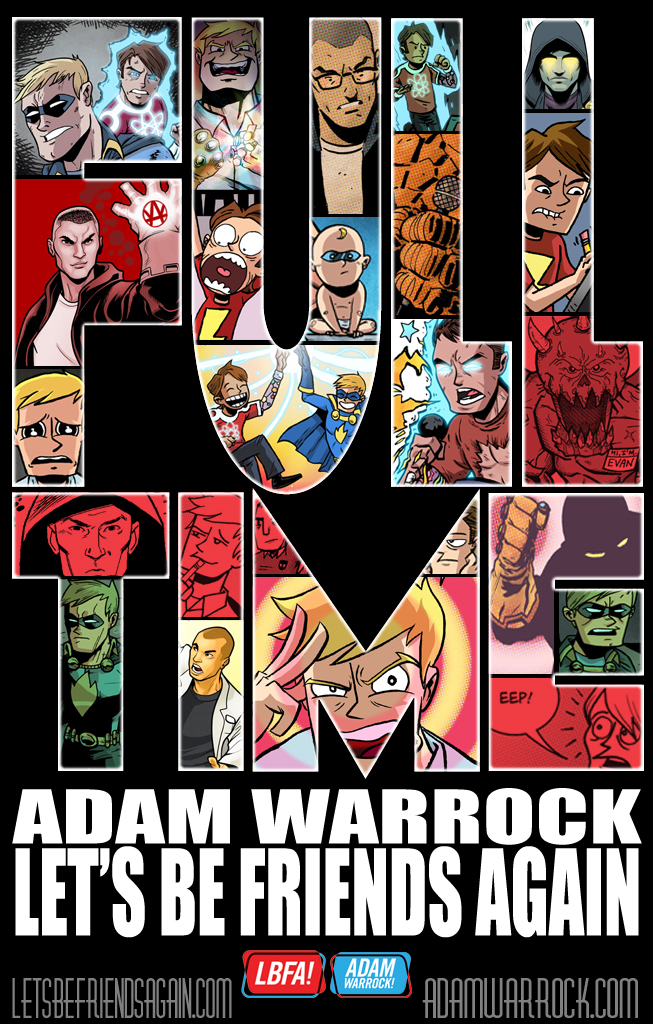
made a song about LBFA, specifically the friendship, before they had planned the ‘merger’ if you will. But now, these three intrepid Tennessee natives men are all back in Memphis, the dusky town of their origins. I asked Euge how he though moving from Washington DC to Memphis would change his music: “Well, it will make me have a thicker Southern accent, my speech is already slowing down, but it won’t change my music much. By being around other people A) like comics and B) are creating, I’ll have responsive people to bounce ideas off of. It will mean more ideas and more songs, faster.”
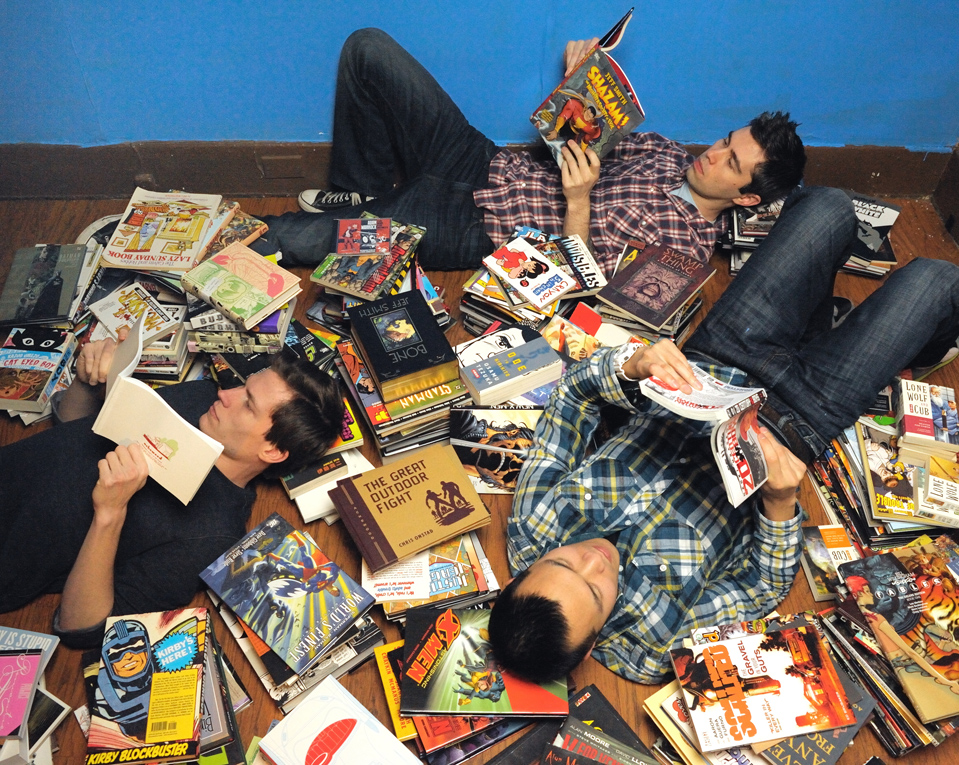
We look forward to fruits of your full-time creative work, guys! If you have yet to read, Let’s Be Friends Again, have a good sit and
start right hereAdam WarRock while you’re at it. Yeeeeaaahh.
—
Jen Vaughn
, cartoonist and librarian, awaits the day a song is written about her comics. Until then, she’ll just listen to profilic Brian Fukushima’s song,
Jen Vaughn, on repeat.

By: Colleen Mondor,
on 2/2/2011
Blog:
Chasing Ray
(
Login to Add to MyJacketFlap)
JacketFlap tags:
Blogosphere,
Add a tag
And so yesterday there was a huge explosion across the lit blogosphere regarding a list of YA books recommended by Bitch magazine. In case you missed it, here are the highlights:
1. Bitch released the list last week entitled "100 Young Adult Books for the Feminist Reader". Lots of folks were impressed by titles on the list and by the fact that Bitch had thought to put a list together for feminist teen readers in the first place.
2. The list began to spread far and wide.
3. Bitch opened a discussion on the list wherein lots of folks chimed in with books they wish had been included (I have to agree with A Tree Grows in Brooklyn - I adore that book) and said many complimentary things about the books that were listed.
4. Some folks however, were disturbed by a few of the titles.
5. There were specific complaints about SISTERS RED by Jackson Pearce and TENDER MORSELS by Margo Lanagan. There was also apparently an emailed complaint about LIVING DEAD GIRL Elizabeth Scott. (I didn't see any commented complaints about that one but might have missed it.)
6. First, SISTERS RED. The complaint was about the rape culture debate sparked by a Book Smugglers review of the book last year. If you're unfamiliar with the book, it is a retelling of the Red Riding Hood story with two sisters who live in a society where women are essentially hunted - it's about hunting the hunters. (There's also a lot more than that, but you get the picture. If you've ever seen "The Wish" episode of BUFFY then you have an idea of what is going on. But no vamps. Or vamp slayers.) Here's part of what the Book Smugglers didn't like:
The Dragonflies [pretty girls] laugh, sweet, and bubbly, and I groan in exasperation. They toss their hair, stretch their legs, sway their hips, bat their eyes at the club’s bouncer, everything about them luring the Fenris. Inviting danger like some baby animal bleating its fool head off. Look at me, see how I dance, did you notice my hair, look again, desire me, I am perfect. Stupid, stupid Dragonflies. Here I am, saving your lives, bitten and scarred and wounded for you, and you don’t even know it. I should let the Fenris have one of you.
The complaint was that the author was suggesting here some girls deserved rape because they asked for it (by the way they dressed/acted). The one protagonist, who has little sympathy for them, is reinforcing this idea with her unsympathetic thoughts. I did not chime in on the debate when it went up because it did not seem to focus on the book or the Red Riding Hood story much at all instead devolving into a discussion about rape in our society and a lot of author bashing. When Pearce commented (and boy was that a mistake), her comments were immediately parsed and analyzed. It was an unproductive discussion and to see it called up as a reason to remove the book from the Bitch list was troublesome to me.
7. Please note, Red Riding Hood has always been a story about female sexuality and allure. The older versions included Red stripping to fool the wolf and escape him (although she did not always get away) and it is believed that Charles Perrault (who made the first use of the color red with the cap or hood) was using the color as a symbol that the girl was a wanton woman - she lured the wolf. The moral was that girls must always be careful of men (wolves).
8. Essentially, if you're going to have a book where women
As an apocryphal critic pithily put it at the time of its release, Richard Lester’s post-apocalyptic film, The Bed Sitting Room, really is “like Samuel Beckett, but with better jokes.” Carrying on and muddling through after the unfortunate “nuclear misunderstanding that led to the Third World War,” the twenty or so survivors in Great Britain live a salvage-filled existence as they heed well the (constantly repeated) imperative to keep moving and obliviously confront the possibility that they will suddenly mutate into animals, bed sitting rooms, and God knows what else. Nominally based on the Spike Milligan and John Antrobus play from 1963, Lester's cinematic version is a staggering vision of waste and remnant, of frozen, necrotic social relations, and of what we keep doing to keep ourselves busy after the end of the world. It is very dark, it is very uncomfortable, it is very funny, and it is very, very British.
The Socialism and/or barbarism blog brings my attention to a British film it sounds like I need to watch very soon!
§ Well, someone had to do it: Sean T. Collins delves deep
into Google cache and old wounds to give a critical look at the legacy of
Dirk Deppey and ¡Journalista!. Like pretty much everyone we talk to, Collins feels that the recent ¡Journalista! as found on the revamped TCJ.com was not as effective as the earlier one. And Collins points out that Deppey himself had much to answer for in the woeful roll-out of TCJ.com:
TCJ.com is, frankly, an embarrassment — comically user-unfriendly (just by way of a for instance, I had to manually search it to find Dirk’s aforelinked post on Paul Levitz
, which had been voted
one of 2009′s best pieces of online comics criticism by one of TCJ.com’s constituent blogs, because
the old permalink didn’t work anymore), spastically updated, intermittently focused, and almost entirely removed from the very discourse Dirk claimed had rendered it redundant. That vacuum allowed the emergence as The Comics Journal’s loudest and most prominent critical voice
an approach to comics and comics criticism that couldn’t be more diametrically opposed to the traditional ideals and values of both the Journal and its parent company Fantagraphics if it were made to wear a snazzy yellow union suit and call itself Professor Zoom, The Reverse Comics Journal. I’ve never had any clear idea who to blame for all this — Dirk, Managing Editor Michael Dean, Assistant Editor Kristy Valenti, or founder/publisher/longtime editor Gary Groth; frankly, I think the buck has to stop at the top.
Given that Deppey was at the forefront of engaging with the comics/internet/journalism connection, some of the blame for the feeble, awkward efforts of the online replacement for a print magazine whose legacy and importance is among the medium’s most towering, should be laid at his feet, given what we know. Any ninny with a few spare hours and a Wordpress or Tumblr account could set up a more functional site than TCJ.com, and that’s troubling. That so much of the site has been overrun by a pack of self-congratulatory screeching baboons doesn’t help, either.

§ And at The Hooded Utilitarian, they have rounded up the Best Online Comics Criticism 2010
and it’s a pretty decent collection — praise must be given to the judges on that score. The winner:
SIX VOTES
(1) Jason Thompson:
Ever since their autumnal launch of Law and the Multiverse
, James Daily and Ryan Davidson, two stalwart attorneys licensed to practice law in Missouri and
Indiana respectively, have used not a brush or nib but the digital pen to question what many fates are in store for superheroes should the law of our land ever catch up to theirs. What might seem like a school lecture is actually an enriching conversation full of ‘what if’s and delivered with the sincerity of a eulogy. The caped situations are approached in such a deadpan manner using precedence from past cases and our own bill of rights, that ignites a chuckle from within and likewise sets to rest those niggling questions that often pop up when one flips the pages of a floppy comic.James and Ryan were nice enough to agree to a Skype interview with THE BEAT recently so they could answer a few questions of mine.












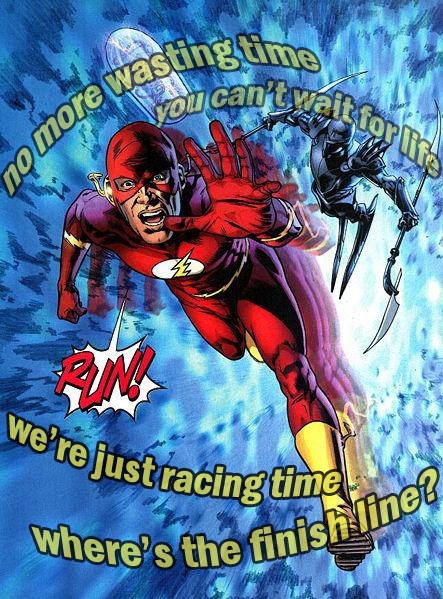
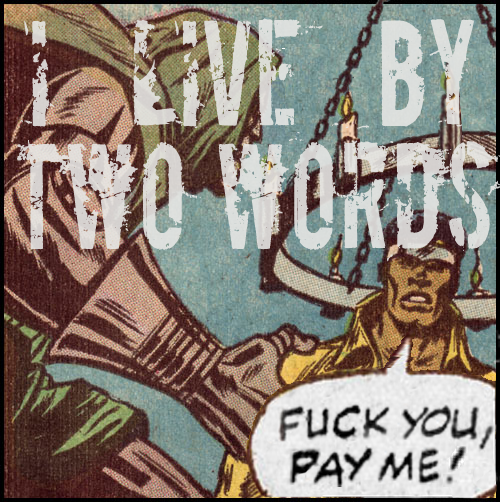
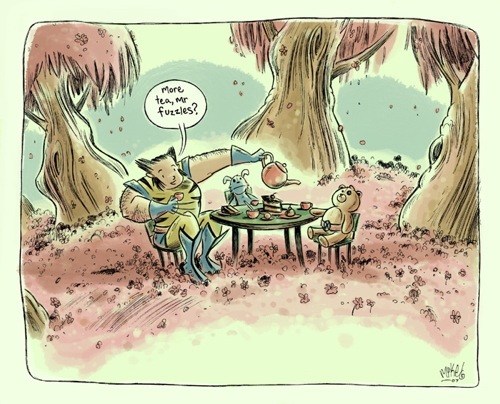
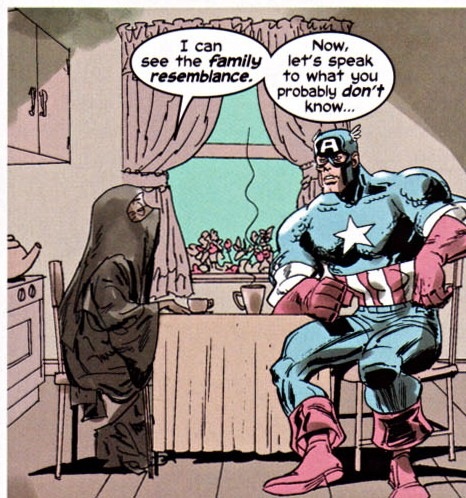
Thanks for linking to that essay, Heidi. Wow, that was an amazing read. I don’t know Tom Spurgeon, but have read his words for many, many years. Best recovery to you, Mr. Tom.
..& I have reposted that Becky Cloonan quote all over the place. She & her work amaze me.
Comics is a weird medium, mainly because it’s a lifestyle. It affects so much of your personal life, and requires loved ones to be understanding, even if they do not understand comics.
I was dealt a big blow in life a couple of years back. My first instinct was to grab the closest piece of blank paper and fill it. People around me did not understand what I was doing, at the time nether did I. It was not until later when I came into downtime I realized that comics was an escape for me, and that it’s probably an escape for the readers. As a creator the world can be brutal to you, the industry itself is not your friend. The reward, and curse, is the black piece of paper and what YOU make of it. I think the people that have comics as part of there life have fond themselves in them, or through them.
This is a truly wonderful essay, with lots of food for thought. I certainly identified with a lot of it! Sending good thoughts to Tom for a long and healthier life!
I read it last night. Very moving, and must reading for anyone who’s been a comics fan for a few decades.
An amazing Life- AND Comics- affirming read.
Here’s to more of http://www.comicsreporter.com/’s analyses, interviews and commentaries showing just how good Comics journalism>/i> looks like!